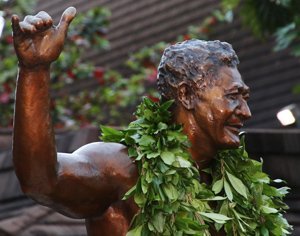
Hamana Kalili Statue
Remember how we recently talked about the PCC putting up a statue of Hamana Kalili in the new Hukilau Marketplace in our March 2015 eNewsletter? You know, the Hawaiian man from Lāʻie who originated what the world now knows as the shaka.
Well, the Cultural Center paid tribute this month to another Hawaiian from Lāʻie when it installed a statue of Joseph Kekuku (1874-1932), the “father” of the Hawaiian steel guitar.
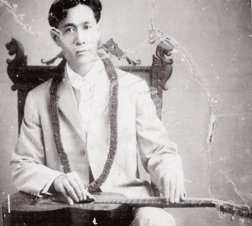 When the young man started performing professionally with his amazing steel guitar, he shortened his beautiful, long Hawaiian middle name, Kekukuupenaokamehamehakanaiaupuni, to Kekuku (note, there are other variations on his middle name). FYI, there are still plenty of his Apuakehau ohana, the last name of his family, and others around here who also honor him.
When the young man started performing professionally with his amazing steel guitar, he shortened his beautiful, long Hawaiian middle name, Kekukuupenaokamehamehakanaiaupuni, to Kekuku (note, there are other variations on his middle name). FYI, there are still plenty of his Apuakehau ohana, the last name of his family, and others around here who also honor him.
Retired PCC Hawaiian cultural expert Cy Bridges, a relative of Kekuku, once explained that the steel guitar inventor is of ali’i or chiefly Hawaiian descent through his ancestors in the district of Lāʻie as well as Kakuhihewa, a celebrated ancient king of the island of Oahu. Bridges also explained that the musician’s middle name refers to the “keeper of the nets of Kamehameha III, who visited Laie and gave that name to Kekuku’s father.
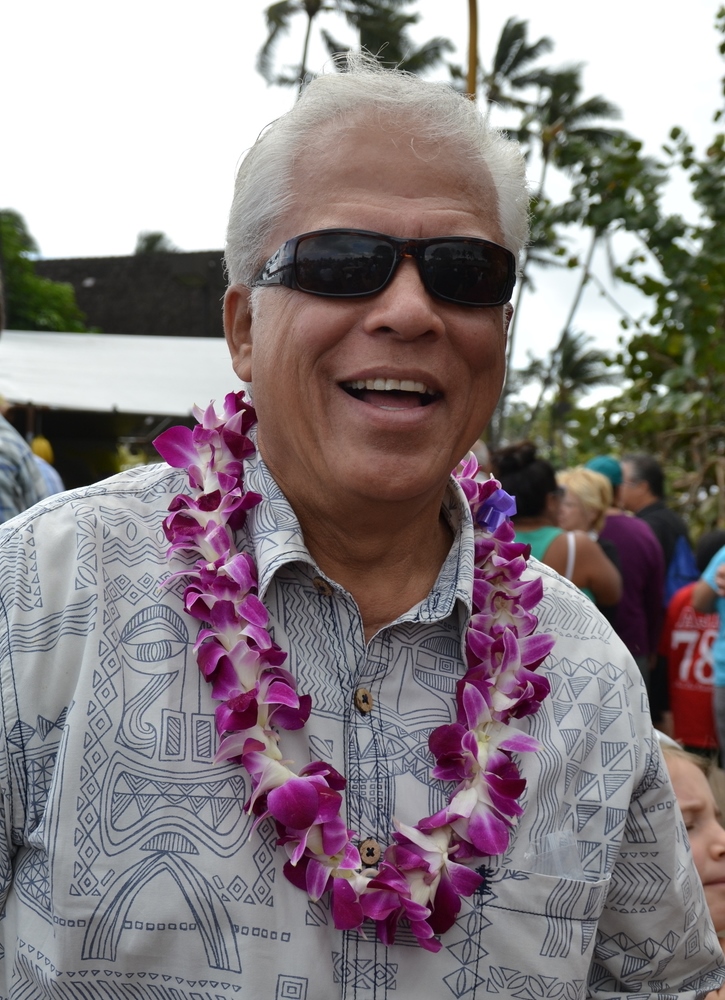 In one version of the story, the young Kekuku is said to have been a student at Kamehameha Schools in Honolulu in 1885 when he accidentally created the first kīkā kila sounds with the back of a comb on the strings. In any case, he soon began performing, and in 1904 he left Hawaii to tour the mainland U.S. with Kekuku’s Hawaiian Quintet, popularizing what Bridges once described as “the signature sound of Hawaii.” From 1919-1927 Kekuku also toured Europe with his Bird of Paradise show, and he married an English woman.
In one version of the story, the young Kekuku is said to have been a student at Kamehameha Schools in Honolulu in 1885 when he accidentally created the first kīkā kila sounds with the back of a comb on the strings. In any case, he soon began performing, and in 1904 he left Hawaii to tour the mainland U.S. with Kekuku’s Hawaiian Quintet, popularizing what Bridges once described as “the signature sound of Hawaii.” From 1919-1927 Kekuku also toured Europe with his Bird of Paradise show, and he married an English woman.
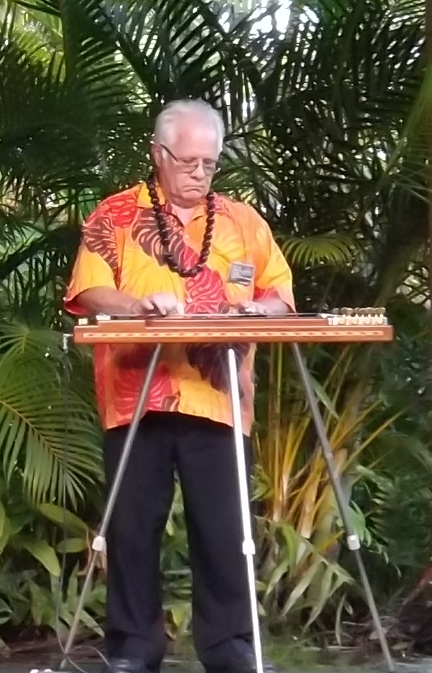
PCC’s own Steve Cheney with his handmade steel guitar
Returning to the states, Kekuku ran a popular music school in Chicago, then moved to Dover, New Jersey, where he continued to perform vaudeville and taught. He died on January 16, 1932 — about the time electrification of the steel guitar would take the instrument to a whole new range of popularity, especially in country/western and blues genres. The Steel Guitar Hall of Fame inducted Kekuku in 1993, and recognizes him as the inventor of the Hawaiian steel guitar.
His invention is sometimes incorrectly called a Hawaiian guitar, although this more correctly applies to Hawaiian slack-key guitar. It’s also sometimes called a Dobro, after an early manufacturer of the instrument; and a slide guitar, which technically imitates steel guitar sounds with a metal pinkie slide. Modern steel guitars can be played flat on the lap (sometimes called a lap steel), on a strap so the musician can stroll, or on several different types of stands (including table or console steels and pedal steels).
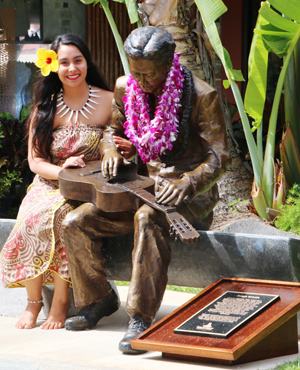 As was also reported in the March 2015 PCC e-newsletter, PCC President & CEO Alfred Grace explained that the Center commissioned Leroy Transfield, a former Maori student worker and now a professional sculptor residing in Utah, to create two statues for the new Hukilau Marketplace to focus attention on Hawaiian kūpuna (ancestors) who have garnered worldwide attention, but the public probably doesn’t know they came from the small community of Lāʻie.
As was also reported in the March 2015 PCC e-newsletter, PCC President & CEO Alfred Grace explained that the Center commissioned Leroy Transfield, a former Maori student worker and now a professional sculptor residing in Utah, to create two statues for the new Hukilau Marketplace to focus attention on Hawaiian kūpuna (ancestors) who have garnered worldwide attention, but the public probably doesn’t know they came from the small community of Lāʻie.
Since many steel guitar players sit when they’re playing, Transfield said he designed the Kekuku statue sitting on a bench, partially so “people can sit next to ‘him’ and have their pictures taken.” Please feel free to do so the next time you’re at the Polynesian Cultural Center.
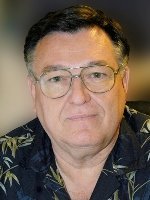
Mike Foley, who has worked off-and-on
at the Polynesian Cultural Center since
1968, has been a full-time freelance
writer and digital media specialist since
2002, and had a long career in marketing
communications and PR before that. He
learned to speak fluent Samoan as a
Mormon missionary before moving to Laie
in 1967 — still does, and he has traveled
extensively over the years throughout
Polynesia and other Pacific islands. Foley
is mostly retired now, but continues to
contribute to various PCC and other media.

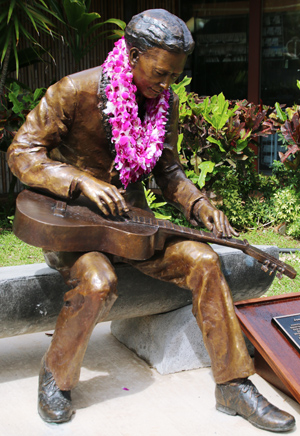
Recent Comments